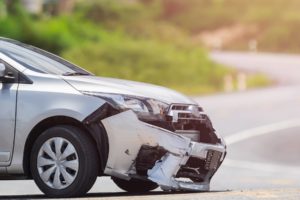Accidents



A single-car accident is always sudden and seemingly comes out of nowhere. Perhaps you’re traveling in the mountains on a 2-lane highway. It’s peaceful and you’re relaxed and enjoying the scenery. Suddenly, a deer appears in the roadway and you avoid it by slamming into a tree. You are injured, and chances are that nobody saw it happen.

By definition, a single-car accident is a collision involving just one vehicle. Crashes of this type often result in a driver running off the road and losing control. The vehicle keeps going until it rolls over, or collides with a stationary object. If you’re lucky, there’s a guardrail to absorb the energy of the impact and deflect your vehicle back to the roadway or slow it down. Guardrails are engineered to lessen the chance of your vehicle plunging down a hillside.
If the circumstances allow you to drive away or depart the scene and have your car towed — Florida still requires you to file a report of the incident within 10 days. Statute 316.065 provides for an exception if there are no injuries, or there is less than $500 in apparent property and vehicle damage.
It is always your best choice to call 9-1-1 and wait for law enforcement to respond. This way, the investigating officer can create a narrative and gather all the facts; including photos of the scene and damage, as well as any obstruction that caused you to leave your lane. An official police report is invaluable when making an appropriate claim. You may not realize how badly you’ve been hurt, but don’t refuse medical attention. If an emergency paramedic response is not required on the scene, seek an exam as soon as possible.
There are a number of possibilities when establishing a single-car accident fault. You may be at fault yourself for negligence if you fail to use reasonable care, or the crash was due to an equipment defect and you ignored the manufacturer’s recall. More likely, in this type of car accident, another driver’s distracted driving or sudden dangerous road conditions have forced you to react by swerving or veering off the road.
As with other types of accidents, Florida’s no-fault laws apply — up to the minimum $10,000 limit of personal injury protection (PIP). Though a large percentage of your medical expenses and vehicle repairs are included in PIP, this kind of policy does not provide liability for damaging another’s property. This works both ways. If another party or, say, lack of road maintenance was the cause of your injuries and damages, then others may be found to be responsible for the difference in your recovery.
If you have sustained substantial injury or damages in a single-car accident, it’s always best to discuss your case with a personal injury lawyer. There are rigid timelines in which you must file claims or lawsuits in Florida, and a free consultation will ensure that your rights are protected. Pursuing your case with no out-of-pocket expenses, and recovering no less than what you deserve is our mission.
More questions? We are here to help.
Complete our confidential evaluation form to have your case reviewed for free by our attorneys and staff.
An attorney or intake specialist will contact you directly to discuss your case at no cost to you.
From the moment you hire us, we will stand behind you, fighting to get the results you deserve.
As the law firm Florida has trusted for over 40 years to fight on their behalf, we are more than ready to represent you. Put our experience and reputation to work. If you need help with any legal matter, whether it’s a personal injury, workers’ compensation, disability or bankruptcy case, contact us now. The consultation is absolutely free.
Get the answers you need. We’ll review your case today, for free.
"*" indicates required fields